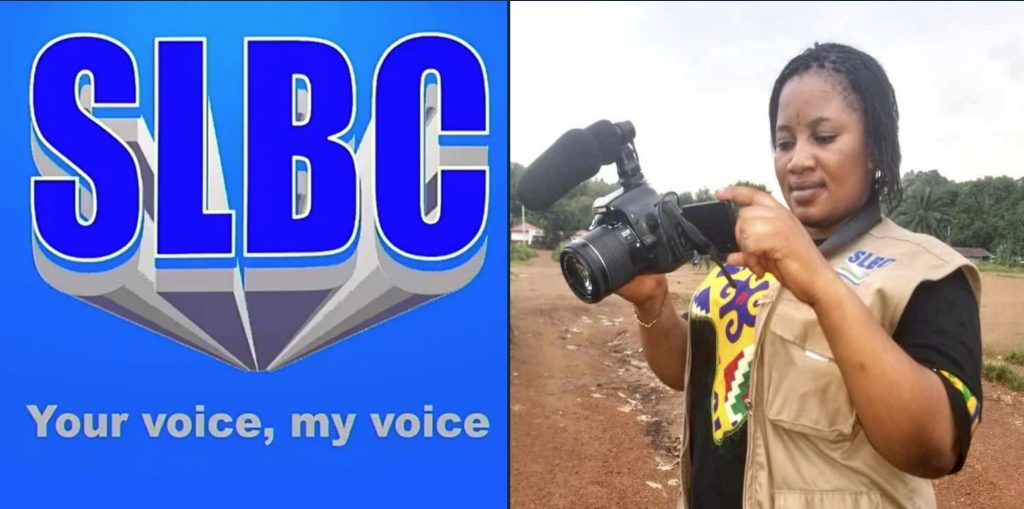Umu Thoronka
Umu Thoronka, a former employee of the Sierra Leone Broadcasting Corporation (SLBC), has publicly challenged the management’s claims regarding her dismissal, labelling it as “unlawful termination.” In a press statement, Thoronka addressed what she described as a series of erroneous assertions made by the SLBC management about her employment history and status, particularly in light of her recent dismissal.
The SLBC management has claimed that Thoronka was never a reporter for the organization and that her employment was limited to a brief period from 2015 to 2018. However, Thoronka vehemently refuted these assertions, stating that they are not only factually incorrect but also misleading to the public regarding the circumstances of her termination.
According to her, the management’s narrative appears to be an attempt to obscure their wrongful actions in dismissing her after she shared an analytical video excerpt from a Presidential Townhall meeting that took place in July 2024 on her social media platforms.
Thoronka clarified that her career in journalism began with the SLBC in 2014 as a volunteer. Through her dedication and hard work, she rose to become a core reporter, presenter, and producer within the organization.
She emphasized that her tenure at SLBC continued until her abrupt dismissal in August 2024, highlighting her commitment to both radio and television programming during her time there.
Despite her dedication, Thoronka revealed that she had made numerous attempts to secure permanent employment with a formal contract since 2015. Unfortunately, these attempts were consistently met with obstacles. She explained that her aspirations for promotion were often linked to inappropriate demands from individuals in positions of authority, which she firmly refused to entertain. Consequently, whenever job vacancies arose, she would apply but be repeatedly overlooked in favour of individuals she had trained.
In her statement, Thoronka detailed her attempts to apply for the position of Reporter/Presenter on two occasions—June 15 and November 26, 2020. Each time she was shortlisted and invited to the SLBC Headquarters in Freetown, she was redirected to a hotel instead of being offered a formal employment contract. Upholding her principles, she declined these invitations, which ultimately led to the rejection of her applications.
Thoronka expressed her astonishment at the SLBC’s claims regarding her employment timeline, stating, “If the SLBC Board claims that I left the organization in 2018, how is it possible that I was awarded the titles of Best National Reporter (Radio) on Health and Best TV Personality of the Year 2021 by the Sierra Leone Health Reporter Network and Faces of the North Entertainment Awards (FaNEA)? These accolades are a testament to my hard work and dedication at SLBC.”
Moreover, Thoronka denied the SLBC’s assertion that she was working solely on a commission basis as a marketer. She clarified that she was appointed as the Head of Entertainment and Marketing in January 2022, during which she produced and presented the popular “AROMA SHOW” every Wednesday. Additionally, she referenced a memo signed by the former manager, Nasiru Dinn Koroma, on January 25, 2022, which requested all unit heads to present a progress report by February 1, 2022. Thoronka complied and submitted a comprehensive report during a well-attended meeting, which remains on record.
The press statement also highlighted that her dismissal was directly linked to the video she shared on her TikTok account. Initial reports communicated to her by the SLBC Makeni station manager and colleagues indicated that certain government officials, including the Director General of the SLBC, Josephine Kamara, were displeased with the video, fearing it could negatively affect the government’s public image. As a result, Thoronka contended that her termination was unequivocally political.
Thoronka expressed her dismay at the SLBC Board’s claims of conducting a “thorough” investigation into her dismissal without ever reaching out to her to hear her side of the story. She questioned the integrity of an investigation that disregards the fundamental principle of natural justice—hearing from all parties involved.
In her statement, Thoronka emphasized that her press release aims to rectify the misinformation propagated by the SLBC management and to advocate for the rights of all employees who may be facing similar injustices. She called upon relevant authorities to investigate the practices of the SLBC and to ensure that the rights of employees are upheld by Sierra Leone’s labour laws.
Thoronka’s case sheds light on the broader issues of employee rights and workplace justice within the SLBC, prompting a call for accountability and transparency in the organization’s management practices. As she seeks to clear her name and challenge the narrative surrounding her dismissal, the situation raises important questions about labour rights and the treatment of employees within the media sector in Sierra Leone.
As the story unfolds, many are left wondering about the implications of her claims and the potential for change within the SLBC. Thoronka’s determination to fight for justice not only for herself but also for her colleagues sets a precedent for addressing workplace injustices and advocating for the rights of employees in the country’s media landscape.
More details on this developing story are expected in the next edition.
